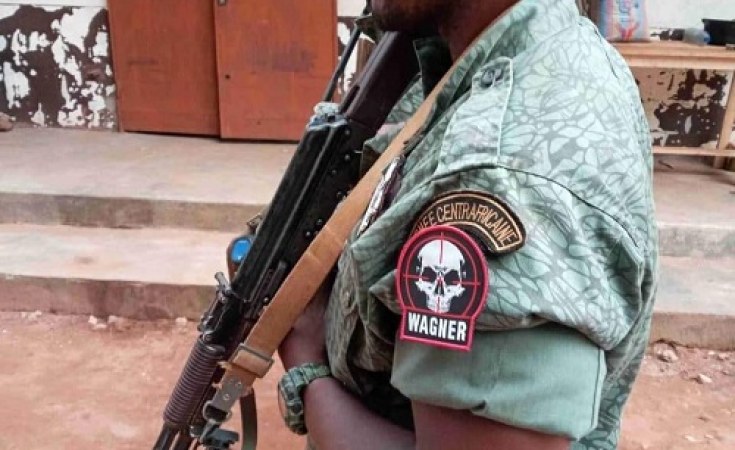Among the EU's latest package of Russian sanctions, members of the Wagner Group mercenary company were included for alleged crimes committed in Africa. The group's exact African footprint is disputed, but it's growing.
The European Union on Saturday announced additional sanctions against Russia's Wagner Group mercenary and economic organization for "human rights abuses" committed in the Central African Republic, Mali, Sudan and Ukraine.
In total the bloc targeted 11 individuals and seven entities it said was linked to the once-secretive private military and economic arm of Russian foreign policy controlled by a historically close ally of Vladimir Putin, Yevgeny Prigozhin. They would face asset freezes and a travel ban.
The Wagner Group itself was already placed under EU sanctions in 2021, the US recently labeled it a "transnational criminal organization."
Saturday's additional sanctions were decided "in view of the international dimension and gravity of the group's activities, as well as its destabilizing impact on the countries where it is active," said a statement from the European Council.
"The Wagner Group's activities are a threat for the people in the countries where they operate and the European Union," EU foreign policy chief Josep Borrell said.
A recent investigative report on the Wagner Group's activities in Africa surmised that it "has rapidly become the most influential form of Russian engagement in Africa today," politically, economically and militarily.
Mostly for activities in Wagner's African heartlands of CAR and Sudan
Although on Western radars for some time, the group and the extent of its activities has come more clearly to light since Russia's invasion of Ukraine -- with Moscow no longer flatly denying the organization's existence, and Prigozhin having come forward and confirmed suspicions of his leadership role in the group.
The sudden hit on Russia's economic ties with the West since invading Ukraine has also prompted the country to step up its diplomatic drive in Africa.
Eight of the 11 individuals and all seven entities sanctions were linked to Wagner's largest and longest-running known operations in Africa, in the Central African Republic and Sudan.
The companies hit by sanctions included gold and diamond mining operations in the CAR and Sudan. A CAR radio station, Lengo Sengo, was also sanctioned on charges of spreading disinformation on Wagner's behalf.
According to a report this month on Wagner by the Global Initiative Against Transnational Organized Crime, the CAR is Wagner's biggest African base of operations.
One person sanctioned by the EU was described as "the security advisor" to President Faustin Archange-Touadera.
"In exchange for access to natural resources -- principally diamonds and gold -- Wagner has provided President Faustin Archange-Touadera with military and political support, which has proven pivotal in sustaining his embattled presidency against an onslaught of rebel groups. The military dependence of the CAR administration on Wagner has translated into a very influential political role for the mercenary organization," the report said.
The group sketched out activities like this as a standard mixture for Wagner, providing both military fighters, military and political and economic advice, and also securing business in the countries, often extracting raw materials, for businesses with ties to Wagner or Russia or both.
Mali operations also in focus after French claims of war crimes
Wagner's presence in CAR soon led to the departure of a French-led international peacekeeping force in the country, as was the case even more abruptly last year in Mali.
Mali's ruling junta last year forced French troops out of the country soon after committing a coup and welcomed in Wagner forces. It has since been hailing Russia as contributing to an end to post-colonial French influence in the country.
One of the individuals sanctioned on Saturday came under an EU sanctions regime for Mali specifically.
At a vote at the UN General Assembly this week, Mali and Eritrea went from abstaining in comparable past votes to joining with just five countries typically voting against motions criticizing Russia's invasion of Ukraine -- Syria, North Korea, Nicaragua, Belarus, and Russia itself.
The other two Wagner-affiliated individuals sanctioned were suspected of war crimes in Ukraine, after reports of the organization having to move some of its fighting forces from African countries like Libya and Sudan to reinforce closer to Russia in recent months. They were Wagner commanders said to be linked to Russia's capture of the town of Soledar in Ukraine in January.
'Looking to expand into new territories'
February's report into the Wagner Group had concluded that: "Looking ahead, it appears that Wagner is looking to expand into new territories in Africa, even as some of its troops have been drawn into supporting Russia's increasingly long-term war in Ukraine."
Russia and the US have both been on repeated diplomatic missions to Africa since the outbreak of the war in Ukraine, trying to win allies and explain their positions as the fighting has serious knock-on impacts for food and fuel prices for some of the poorest parts of the world.
This week, Moscow denied reports of Wagner already being operative in Burkina Faso -- another West African country that recently underwent a coup, fell out with former colonial power France, and is showing no sign of a return to democratic rule.
But as well as disputing Wagner's presence, Russia said it would "actively participate in collective efforts to stabilize the situation" and "develop a multifaceted cooperation with Burkina Faso," including potentially training the country's military.
(AFP, dpa, Lusa)


